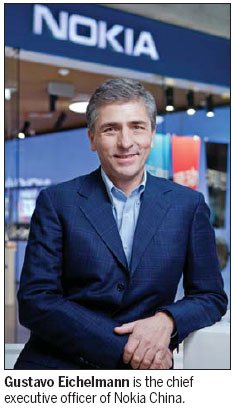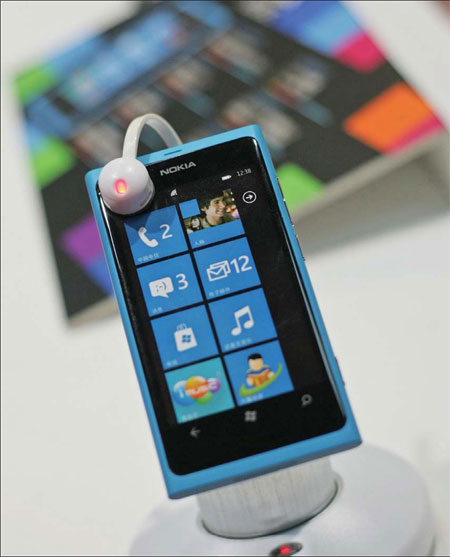Nokia's bid for a new dialogue
Updated: 2012-07-20 12:21
By Su Zhou and Lin Jing (China Daily)
|
|||||||||||
|
Nokia launched its first Window Phone Lumia 800C in China in late March. Provided to China Daily |

Once a household name for mobile phones, the struggling company is looking to China for revival
Gone are the days when Nokia ruled the market. Gone are the days when everyone owned one of its mobile phones that looked smaller than a short stack of business cards.
Zhang Ying, a civil servant from Jiangsu province, remembers those days well. As a college student in 2005, she says her friends would boast of having the latest Nokia. Not anymore. "It (Nokia) is outdated," she now says.
The Finnish multinational company once made its mark with its intuitive mobile phones, high-quality voice calls and services like text messaging. But for the past five years, it has failed to catch up to the market craze for smartphones that come with advanced operating systems. Needless to say, the company is need of a rebound - and its executives hope it starts in China.
In the Middle Kingdom, where Nokia's mobile phone competitors are targeting the rising middle class with smartphones, the company is following through on a different path. It is launching phones that are equipped with the basic functions but come at cheaper price tags. If the company is to make a comeback, it believes the low-end market will help it get there.
Gustavo Eichelmann, the Nokia China chief who took over at the beginning of this year, is optimistic.
"I believe Nokia can regain its position in this industry," he says.
| |||
"The changes are necessary for Nokia to focus its strategy and accelerate its execution," Eichelmann says.
The Nokia China chief admits that the company lost its lead in the mobile phone market, but estimates that China has about 300 million people that have never used a mobile phone and don't want a smartphone.
"They are looking for cheap, simple and good quality mobile phones."
He describes these so-called feature phones as smarter devices. They are traditional mobile phones running on simpler operating systems, as opposed to the Android, iOS and Windows Phone OS. Nokia's new phones will be equipped with functions that you can find in a smartphone, such as touch screens, games, mapping services and an app store.
But one major difference will be the price tag.
Nokia recently launched three feature phone models - Asha 305, Asha 306 and Asha 311 - at the cost of about 500 yuan ($78, 64 euros). The 16GB model of the Apple iPhone 4S, by a loose comparison, costs 4,988 yuan.
"Though almost everyone is obsessed with smartphones, Nokia is not going to abandon the feature phone market," Eichelmann says. "The feature phone is our field, with years of research and development investment, market research and brand recognition. We will bring smarter phones to 300 million people in China."
Though Nokia has strong competition in emerging markets such as China, India and Africa from the likes of Huawei Technologies Co Ltd and ZTE Corp, Wang Ying, a researcher at Analysys International in Beijing, says Nokia still has the advantage in price.
While Nokia focuses on its feature phones, it is also pulling out all the stops on its smartphones. Its smartphone market share in China fell to 11.1 percent in the first quarter of this year, from 24 percent in the same period last year, according to Analysys International.
"Nokia is now a challenger as well as a learner," Eichelmann says. "We are facing challenges from new players with different background, which originally were not our rivals (such as Internet giant Google). It requires us to respond fast to the market."
Previously, Nokia's feature and smartphones ran on the company's Symbian OS. But in October, its new line of Lumia smartphones in October debuted with the Windows Phone OS.
Nokia says it has sold more than 3 million units of the Lumia smartphones but that excludes the Chinese market since the line of smartphones was only available as of March. Recently, the Lumia 800 and 900 models each won gold honors in this year's International Design Excellence Awards.
"Lumia is special in design and with customized apps only for Chinese users," he says.
Still, industry experts are not as optimistic as Eichelmann.
"It is facing more competitors than before, and it is not going to survive easily," says Yang Xingping, former CEO and president of Dopod, the first Chinese smartphone maker. "Now the smartphone world is divided into three camps based on their operating systems - iOS, Android and Windows - and Nokia picked Windows, which is not an easy way to go.
"The Windows (Phone OS) still needs time to develop," Yang adds. "Nokia needs to promote the system not only among consumers, but also among app developers."
Nokia took a beating after Microsoft announced last month that the Lumia series won't be upgraded with the new Windows Phone 8 OS, prompting the company to slash the price of its Lumia 900 in half to $50 (41 euros) in the United States. The price cut came just three months after its launch.
"Microsoft released the Windows Phone 8 recently which really has had a bad effect on the sales of Lumia series because most of the consumers in China have the feeling that Lumia series went out again, only three months after the debut of Lumia series in China," Yang says.
Eichelmann says Nokia is working with Microsoft to introduce a software update for the Lumia series.
"Before the release of Windows Phone 8, we can say Lumia series were good cell phones," he says. "After the release of Windows Phone 8, we will also do everything we can do to make sure that Lumia series are still good cell phones."
Eichelmann does point out that Nokia is having difficulties in promoting the line of phones and the operating system. The feedback Nokia China received from the marketing and sales teams is that most consumers have heard of the Windows Phone OS but have not tried it yet. To attract more consumers, Nokia launched a six-week campaign in May and June with five videos promoting the phones. The videos were viewed 163 million times online. The micro blog of Lumia was reposted 1.69 million times.
Despite the marketing efforts, Nokia and other manufacturers of traditional mobile phones are up against the wall because "it is all about (using the same operating system for different electronic devices) and cloud computing now", says Lu Chun-kuan, an analyst with Gartner Consulting, an IT research and advisory firm based in Connecticut.
"But there is still room to differentiate such as in innovative phone designs branding, quality, customer service and cost excellence," Lu says. "Nokia still has a good brand in China so the first priority is really about making a good product."
Contact the writers at suzhou@chinadaily.com.cn and linjingcd@chinadaily.com.cn
(China Daily 07/20/2012 page15)
Today's Top News
Rescuers race against time for quake victims
Telecom workers restore links
Coal mine blast kills 18 in Jilin
Intl scholarship puts China on the map
More bird flu patients discharged
Gold loses sheen, but still a safe bet
US 'turns blind eye to human rights'
Telecom workers restore links
Hot Topics
Lunar probe , China growth forecasts, Emission rules get tougher, China seen through 'colored lens', International board,
Editor's Picks

|

|

|

|

|

|








